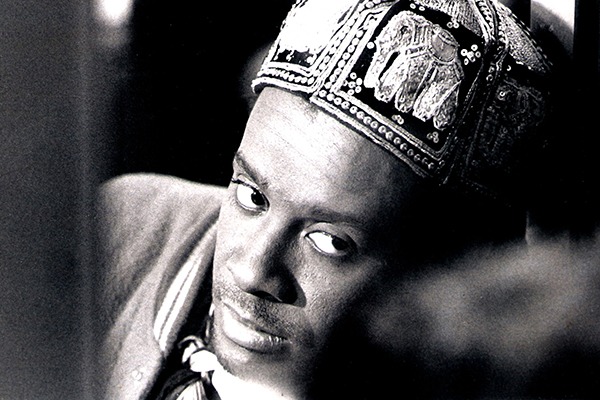Paul Outlaw

Endurance. Luck. Connections. Ambition. Talent. When asked what advice he would give to young people hoping to build a life in the arts, Paul Outlaw ’74 names these qualities as crucial for success.
Though he doesn’t dismiss the need for talent, Outlaw does put it last on his list. “You have to have something in you, a calling,” he says, “but you need the other qualities first. Without those, talent can be squelched.” Elaborating on the first trait, he adds: “Many people fall by the wayside. They give up. But if you stick with it, there is some measure of success to be had in just being committed to your art.” A Los Angeles-based experimental theater artist and vocalist whose work explores themes of race, sexual identity, American history and violence, Outlaw has devoted a lifetime to his craft, which he first began to hone onstage in Fisher Theater as a student in the early 1970s, and later at New York University’s Tisch School of the Arts.
A genre-busting artist, Outlaw has been involved in a diverse range of projects, including indie films, a play that traces the journey of a 300-year-old vampire “from slave to abolitionist to diva,” and solo performances across the U.S. and Europe. He has also recorded songs for a number of film soundtracks and recently appeared as a guest artist on Splendor & Misery (Sub Pop Records), an album by the hip-hop group Clipping, fronted by Tony Award-winning Daveed Diggs, of Hamilton fame. Short-listed for a Hugo Award, it’s the first record album nominated for the science-fiction prize since 1971. (Their competition includes two iconic episodes of “Game of Thrones.”)
In January, Outlaw returned to campus for the first time in 19 years, to screen the 1993 film Schwarzfahrer (Black Rider), as part of the Academy’s annual MLK Day programming. The film, in which his character outwits an elderly train passenger who subjected him to a racist tirade, won an Academy Award for Best Live Action Short. Directed by Pepe Danquart, Schwarzfahrer was Outlaw’s first starring role in a film, and it was a combination of luck, connections and talent that got him the part: “I had been living in Germany for about 10 years and was getting ready to move back to the States when I learned that a friend’s friend, who worked in casting, was looking for a German-speaking actor who could play an African immigrant.” One of the few black actors living in Berlin at the time, the young expat fit the bill.
Although it took some prodding by Outlaw, a self-described Oscar fan, for the producer to consider entering the film on the festival circuit, the movie has since become a part of film history. In addition to winning at the Academy Awards, it has been taught in the film program at Columbia, screened at high schools in several countries to help facilitate discussions around race, and viewed more than a million times on YouTube. Outlaw attributes Schwarzfahrer’s enduring success to the fact that even though it arose out of a particular time and place — after the Berlin Wall had come down and German society was confronting new xenophobia and racism — the film still resonates today: “In 2017, with the polarization of the left and right and the increase in hate crimes, [the film] retains its timeliness. A lot of the things the old woman says about the influx of foreigners in Germany, we’re seeing that attitude now in America.”
As for Outlaw’s longevity, he has all the qualities he mentioned — plus adaptability — to thank. “I make a living through so many streams,” he says. “Unless you are a constantly working TV or film actor, you’re always struggling. If you accept that as the nature of the beast, you won’t become desperate.”
—Genny Beckman Moriarty
Editor’s note: This profile first appeared in the summer 2017 issue of The Exeter Bulletin.


